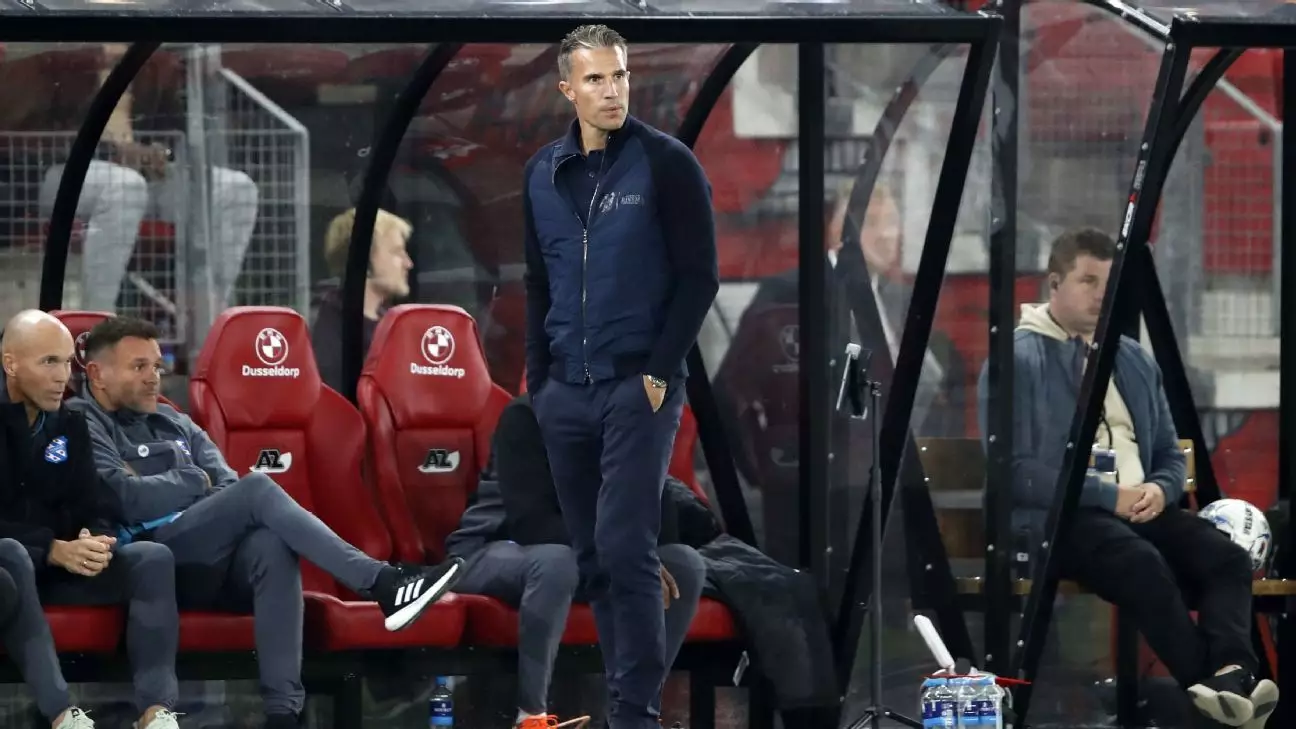In the competitive realm of football, losses are not merely numerical representations but are laden with implications for the team, players, and coaching staff. Recently, Heerenveen faced a staggering 9-1 defeat to AZ Alkmaar, a match that head coach Robin van Persie evocatively compared to his own experience of an 8-2 loss during his years at Arsenal. Such parallels reveal how defeats serve not only as scorelines but as significant moments in a team’s journey, underscoring the necessity of resilience amidst adversity.
Van Persie’s reflections make it evident that football is as much about psychological fortitude as it is about tactical prowess. For a manager newly appointed in May, navigating a transition with such pronounced setbacks becomes a critical aspect of leadership. Heerenveen currently sits at a disappointing 12th place in the Eredivisie, with a record comprising only one win, one draw, and two losses. The inconsistency is palpable, and it brings forth pressing questions about development, strategy, and improvement moving forward.
The harrowing nature of Heerenveen’s defeat calls for a deeper examination than simply quantifying the score. Losses like these can fractured morale, but Van Persie’s management philosophy focuses significantly on the long-term growth that arises from such setbacks. He candidly referenced his own past experiences, indicating that such humiliations can foster critical lessons, albeit painful ones.
Reflections from Van Persie emphasize that it is vital for athletes to acknowledge and own their shortcomings. By doing so, they cultivate resilience, an essential trait that can ultimately influence success in future encounters. The post-match atmosphere, which often swirls with negativity, can easily drown constructive criticism; thus, how a team internalizes defeat becomes crucial. For Van Persie, the key is not to gloss over the loss but to face it head-on, fueled by a determination to extract learning from the ashes of disappointment.
Throughout the aftermath of such a demoralizing loss, Van Persie highlighted the importance of unity and collective strength. He pointed out that while victories elicit joy and celebration, facing a defeat demands a certain vulnerability that exposes the character of a unit. “You have to own that,” he asserted, pushing the narrative that it’s easy to appear confident in success but challenging during moments of defeat.
Furthermore, the Dutch manager’s insistence on maintaining his attacking philosophy post-defeat is a testament to his coaching ideals. Rather than opting for a defensive, reactive strategy in the wake of conceding multiple goals, his commitment to a pre-established game plan reflects a deep-seated belief in the collective capabilities of his players. It reiterates that evolution in football often responds to adversity and can be pursued even in the face of unexpected outcomes.
As Heerenveen prepares for its subsequent fixture against FC Twente, the mindset cultivated following this historic defeat will be put to the test. Building a resilient squad, one that learns to navigate tough phases while retaining its identity, ultimately determines how players evolve as individuals and as a cohesive unit. The next matchup will reveal whether the lessons learned from the AZ encounter are incorporated into their tactical execution and mental tenacity.
While the game of football is frequently judged by immediate results, it thrives through the underlying currents of resilience, unity, and the real-time challenges presented by losses. For Heerenveen and Van Persie, the path ahead will not only be a test of skills but of character, a crucial element that can redefine their narrative in the Eredivisie moving forward. The journey remains arduous, yet with lessons from defeat in their toolkit, the possibility for resurgence and growth endures.


Leave a Reply